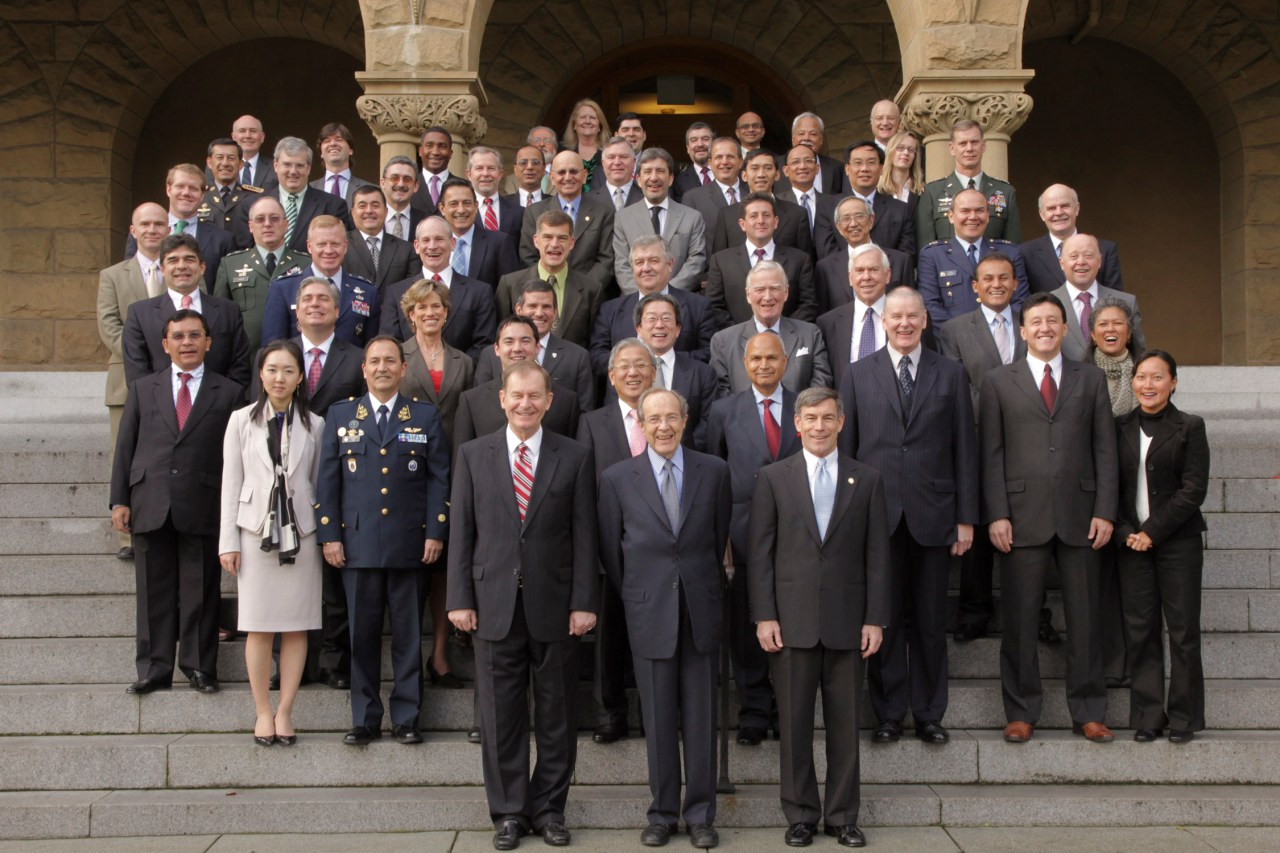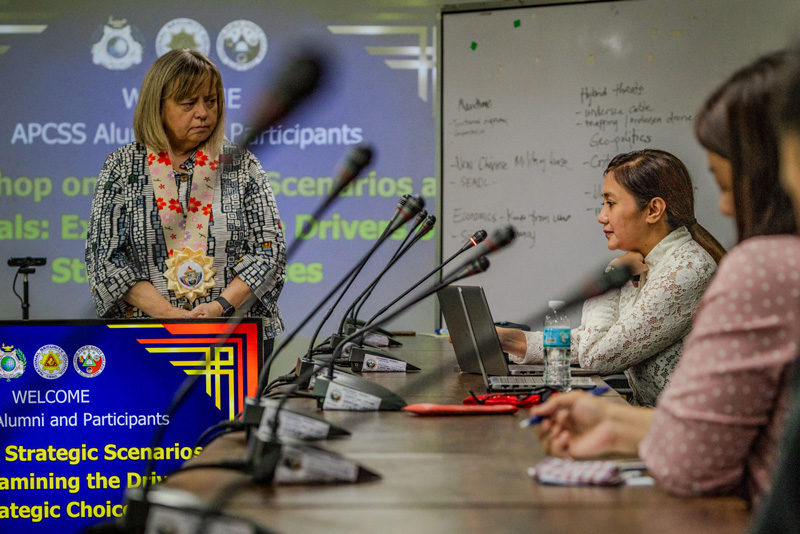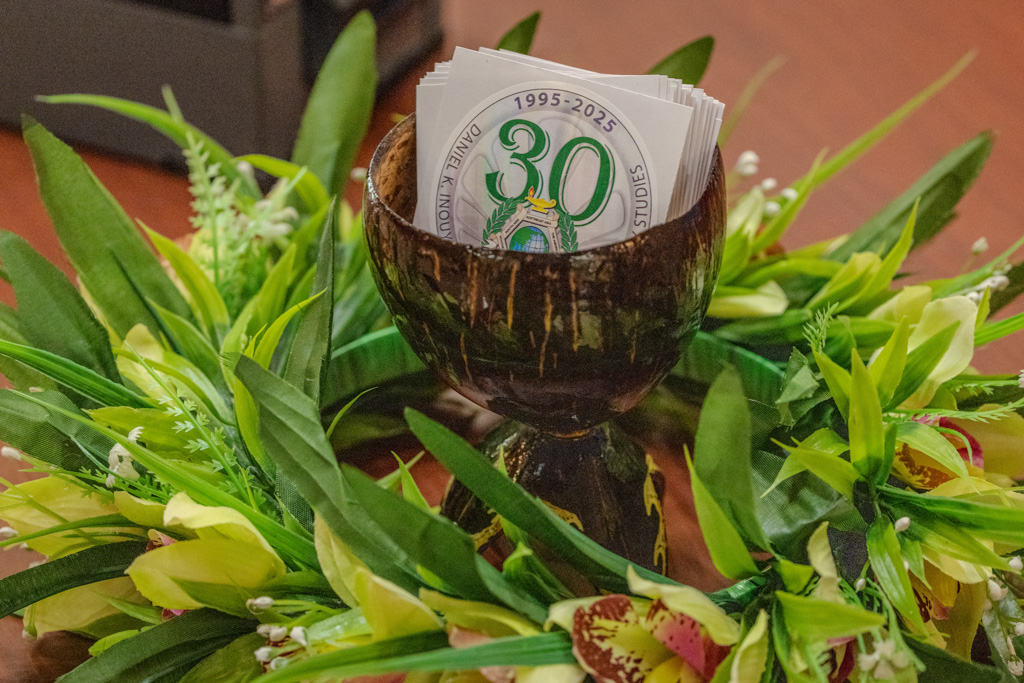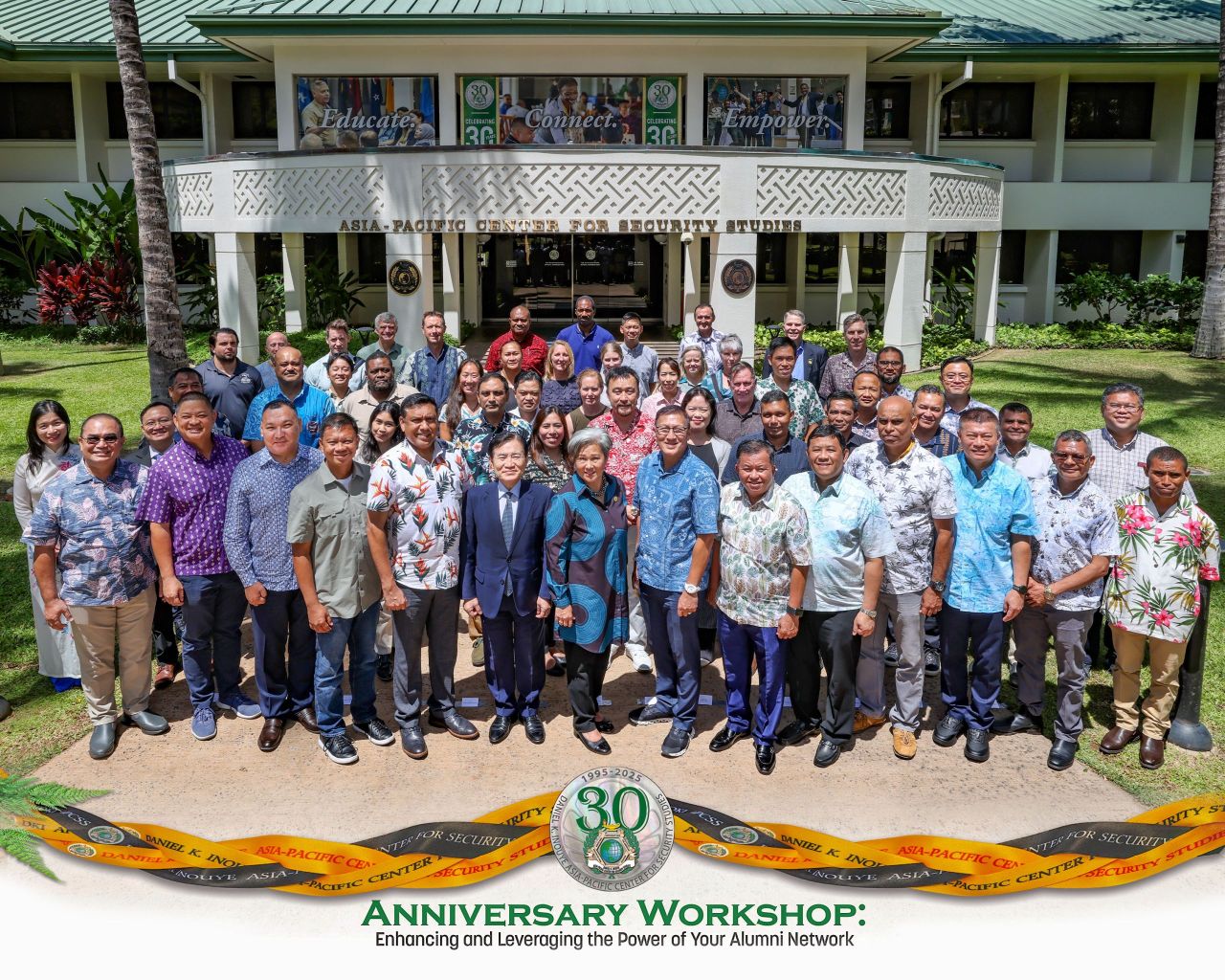Note: Due to non-attribution format of PACRIM II, participant names are not used in this story
“Managing the Global Commons” was the theme for the 2010 Pacific Rim Security II (PACRIM II) conference, held at Stanford University Feb. 22-24 in Palo Alto, Calif.
PACRIM II brought together senior officials from the security sector, academia, and the private sector from Pacific Rim countries to continue the discussion launched by PACRIM I in 2009 on common challenges and opportunities facing nations in the region in the global commons.
The three-day PACRIM II was co-hosted by the Asia-Pacific Center for Security Studies (APCSS), the Center for Hemispheric Defense Studies (CHDS), and the Freeman Spogli Institute for International Studies (FSI).
While PACRIM I was more about the security of the maritime domain, a high priority for maritime Pacific nations, PACRIM II attempted to broaden the scope of discussion. Thus, a great deal of time was devoted to energy and environmental security as well as the cyber domain and pandemic disease.
PACRIM II participants from the Asia-Pacific and the Americas shared perspectives on the following topics:
- Nuclear Energy: Challenges and Opportunities
- Building Resilience in the Face of Transnational Threats
- Strengthening Regional Security Interfaces and Cooperation: U.S. Combatant Commander Perspectives
- Renewable Energy: Public-Private Cooperation
- Future Issues in the Global Commons. (see sidebar below for results)
Keynote speakers for various events of the conference included Dr. Arun Marumdar, Director, Advanced Research Projects Agency (ARPA-E) ; Dr. Michael May, Professor Emeritus (Research), Stanford University; Dr. Brahmn Chellaney, Center for Strategic Studies, India; Mr. Peter Schwartz, Futurist and Co-Founder of Global Business Network.
“The level of information from the presenters as well as the participants in the audience was superb,” commented one participant. “The way that topics could be related to this regional security of the Pacific Rim region was extremely relevant. The point of views from participants and presenters (other than the U.S. position) was valuable and very interesting.”
APCSS country representatives included two each from Australia, China, India, Indonesia, Japan, Korea (ROK), the Philippines, and Russia (16 total). CHDS brought in country representatives from Canada and South America which included Mexico, Panama, Ecuador, Peru, Chili, and Columbia.
U.S. attendees were Lt. Gen. Daniel Darnell, Deputy Commander, U.S. Pacific Command; Amb. Paul A. Trivelli, Civilian Deputy to the Commander, U.S. Southern Command; Gen. Gene Renuart, Commander, NORAD and U.S. Northern Command; Maj. Gen. Lawrence Stutzriem, Plans, Policy and Strategy (J5), NORAD and U.S. Northern Command; and Lt. Gen. Francis Kearney, Deputy Commander, U.S. Special Operations Command.
“The exchange of ideas and perspectives as they relate to the PACRIM and the Western Hemisphere was most thoughtful,” said another PACRIM II participant. “The various dimensions, political, economic, security were most evident. The information shared by the speakers, participants and professional CHDS staff greatly contributed to enhance the discussion.”
Former U.S. Secretary of Defense Dr. William Perry of FSI closed the conference by highlighting the successes of PACRIM II, but cautioned there is no “one size fits all” solution. He also pointed out that the key to success in all these endeavors will be “greater international cooperation and collaboration.”
PACRIM II participants agreed that the key to success is enhancing mutual understanding of the challenges and opportunities among key nations of the Asia-Pacific Rim, and identifying paths forward.
-END-
Click here for the full Executive Summary of the Conference
Major workshop outcomes:
- Better appreciation of common and distinct security challenges experienced by nations on both sides of the Pacific Ocean.
- Identification of possible collaborative mechanisms across the Pacific in dealing with common security challenges.
- Improved partnership opportunities between organizations represented at the workshop.
- Constructive interaction between the policy and scientific communities represented at the workshop.
General Workshop Findings:
- The participants were unanimous about the need to advance regional cooperation but were also appreciative of the many hurdles and challenges that continue to undermine it. The lack of trust and transparency were viewed as the most obvious ones.
- There are several areas of divergence between the Asian and the American nations of the Pacific Rim.
- Notably in regard to nuclear proliferation, Asia faces severe challenges of horizontal and vertical nuclear proliferation. By contrast, in Latin America Brazil and Argentina have increased peaceful nuclear cooperation since their mutual decision in the 1990s to forego the option of nuclear weapons.
- With regard to Transnational Threats, the Asian nations seemed to have a greater focus on inter-state issues, while the nations of the Americas are looking more at intra-state challenges, such as criminal networks, smuggling and illegal arms smuggling.
Specific Workshop Findings:
Nuclear Issues:
- Nuclear energy, with its promise of almost zero carbon emissions, is an important part of global energy future. However, concerns were raised about challenges which may cloud its future: safety concerns, particularly given the fast pace of reactor construction planned in some parts of the globe Proliferation concerns as the sheer number of material, facilities and experts grows.
- Fuel supply confidence, both in the face of limited suppliers and possible limits on the global supply of Uranium.
- A North East Asia multilateral fuel arrangement would leverage the strengths/needs of each state in region: Mongolia has bountiful Uranium reserves, Russia has excess technological capacity to enrich Uranium, and China/Japan/Korea need low enriched Uranium fuel.
- Brazil and Argentina’s cooperation to abandon clandestine nuclear weapons programs and to build safe and secure nuclear energy facilities demonstrates the effectiveness of international cooperation.
- Nuclear weapons will continue to pose a challenge even as major nuclear weapons states have pledged to reduce their arsenals to Zero. As we work toward zero, perhaps it is possible to enhance security through a verifiable No First Use posture…with verification coming from low numbers of weapons, de-mating of warheads, low alert levels, no overseas deployment, and no arms race.
Building Resilience in the face of Transnational Threats:
- The experience of some South American countries demonstrates that leadership is key to success versus insurgency, criminal networks, and arms smuggling.
- Collective security requires common threat perceptions, which is lacking at this time.
- Coalitions need to be built both among nations and among agencies within nations.
Renewable Energy:
- Korea’s Green Growth Plan will invest 2% GDP in Green Technologies over the next 5 years…Green is the future engine of growth.
- There needs to be better communication between the science and policy communities, and the public…Scientific community sees need for “numbers not adjectives” in public debate.
- One problem with key renewables such as wind and solar is that the supply cycle does not well match the demand cycle.
- Different countries will require different alternative energy mixes – no one size fits all.
Climate Change
- Efforts to address climate change through international negotiations have been obstructed by three key issues: Geopolitics, efforts to achieve global consensus, and efforts to solve all problems at once.
- Getting an agreement on climate change is important for resiliency and maintaining the relevancy of existing international institutions .
Pandemic
- International Cooperation Essential vs Pandemic…not least because diseases and the animals carrying them do not respect Customs and Immigration posts.
- SARS forged unprecedented unity of cooperation of the public and private sector.
Cyber Security:
- One uniqueness of the cyber commons is that it has been created rather than discovered, allowing an unprecedented ability to manipulate.
- While security concerns are a driving force for reduced anonymity, one key value of the anonymity of the internet is that it allows for a “free conversation between opponents” – whether commercial or political
- Current technology means that cyber attack is extremely difficult to defend against, but the indirect consequences which could affect attackers act as a partial deterrent.
- The energy grid and banking system’s vulnerability to cyber attack may be an existential threat to advanced nations.
Recommendations for the Future:
Several notable recommendations for the future came out of the workshop:
- Regarding nuclear energy, re-energizing work on multilateral fuel supply mechanisms could prove to be a highly effective way of ensuring a safe and reliable fuel supply as global nuclear power capacity grows.
- Renewable energy holds great promise to address carbon emissions but current market structures mean the private sector alone will not be able to address. Thus, governments should find ways to fund research and development efforts in these areas.
- Since alternatives to carbon energy are unlikely to be sufficient, success in future climate change negotiations is critical. Thus, negotiations should begin between the largest emitters, and the grow agreements out to progressively larger groups of nations. Disaggregating the issues negotiated will also help, such as focusing initially on energy efficiency and reforestation.
- To Combat Pandemic disease all nations must build up the transparency and information sharing demonstrated in response to the SARS outbreak.
- Effective security in cyberspace requires stronger international collaboration and it may also be useful to pursue a No-First-Use policy for cyber attack.
The Asia-Pacific Center for Security Studies is a Department of Defense academic institute that addresses regional and global security issues. Military and civilian representatives of the U.S. and Asia-Pacific nations participate in our comprehensive program of executive education, professional exchanges and outreach events, both in Hawaii and throughout the Asia-Pacific region. APCSS’ mission is to educate, connect, and empower security practitioners to advance Asia-Pacific security.
Since opening in 1995, the Asia-Pacific Center for Security Studies has had representatives from 72 countries attend courses at the Center.
- PACRIM II conference participants pose for a group photo on the steps of Encina Hall at Stanford University in Palo Alto, Calif. Feb. 24.











Leave A Comment